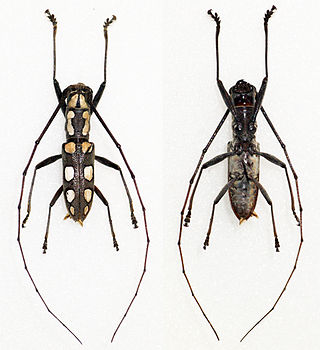
The long-billed pipit or brown rock pipit is a passerine bird which has a wide distribution. A number of subspecies have been created for the populations in Africa, through the Arabian peninsula and South Asia. The systematics of this complex is yet to be clarified. Most birds are residents or short distance migrants.

Monochamus is a genus of longhorn beetles found throughout the world. They are commonly known as sawyer beetles or sawyers, as their larvae bore into dead or dying trees, especially conifers such as pines. They are the type genus of the Monochamini, a tribe in the huge long-horned beetle subfamily Lamiinae, but typically included in the Lamiini today.

Taeniotes is a genus of flat-faced longhorns beetles in the subfamily Lamiinae of the family Cerambycidae.
Taeniotes subocellatus is a species of flat-faced longhorn beetles in the subfamily Lamiinae of the family Cerambycidae.

Lamiini is a tribe of longhorn beetles of the subfamily Lamiinae.

Olenecamptus is a genus of longhorn beetles of the subfamily Lamiinae.
Pseudhammus is a genus of longhorn beetles of the subfamily Lamiinae, containing the following species:
Olenecamptus similis is a species of beetle in the family Cerambycidae. It was described by Dillon and Dillon in 1948.

Hammatoderus confusor is a species of beetle in the family Cerambycidae. It was described by Dillon and Dillon in 1941. Its Geographical distribution is Brazil, Peru, Bolivia, Paraguay, Colombia and Argentina (Misiones).
Pseudhammus similis is a species of beetle in the family Cerambycidae. It was described by Dillon and Dillon in 1959.
Taeniotes boliviensis is a species of beetle in the family Cerambycidae. It was described by Dillon and Dillon in 1941. It is known from Argentina, Ecuador and Bolivia.

Taeniotes chapini is a species of beetle in the family Cerambycidae. It was described by Dillon and Dillon in 1941. It is known from Bolivia, Ecuador and Peru.
Taeniotes dentatus is a species of beetle in the family Cerambycidae. It was described by Dillon and Dillon in 1941. It is known from Ecuador and Colombia.
Taeniotes iridescens is a species of beetle in the family Cerambycidae. It was described by Dillon and Dillon in 1941. It is known from Costa Rica, Colombia, Brazil, and Panama.
Taeniotes batesi is a species of beetle in the family Cerambycidae. It was described by James Thomson in 1879. It is known from Colombia.
Taeniotes leucogrammus is a species of beetle in the family Cerambycidae. It was described by James Thomson in 1865.
Taeniotes marmoratus is a species of beetle in the family Cerambycidae. It was described by James Thomson in 1865. It is known from Ecuador.
Taeniotes parafarinosus is a species of beetle in the family Cerambycidae. It was described by Olivier in 1790. It is known from Peru, Brazil, Costa Rica, Panama, French Guiana, Bolivia, Guyana, and Suriname. It has also been introduced into Guadeloupe.

Taeniotes naevius is a species of beetle in the family Cerambycidae. It was described by Henry Walter Bates in 1872. It is known from Ecuador, Colombia, and Peru.

Taeniotes farinosus is a species of beetle in the family Cerambycidae. It was described by Carl Linnaeus in 1758, originally under the genus Cerambyx.








